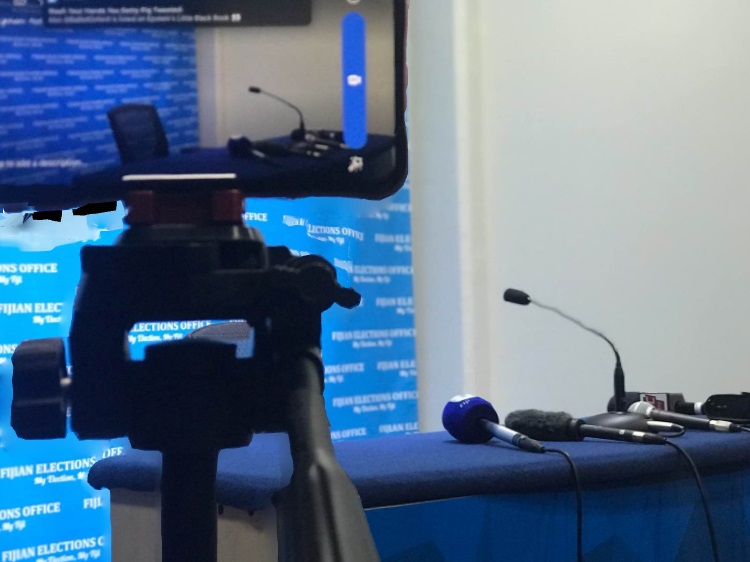Fiji’s Supervisor of Election Mohammed Saneem denies assertions that the Fijian Elections Office is working together with the governing FijiFirst party based on its handling of election-related complaints.
Since the campaign period opened on 26 April this year, the Supervisor of Elections has received and ruled over 10 separate lodgements of complaints, some totaling more than 10 pages in one submission, from six of the nine registered political parties, with the first ruling it appears was handed down in late June.
Out of the six, SODELPA, the National Federation Party, Fiji Labor Party, and The People Alliance (TPA) party have been referred to the Fiji Independent Commission Against Corruption (FICAC) including some of their provisional candidates. Also referred to FICAC was a Unity Fiji provisional candidate Ratu Jope.
Some of the complaints were referred directly to FICAC for apparent electoral breach whilst others stem from the failure to comply with SOE directives, to remove statements and videos that were in breach of election rules, within the stipulated time.
The governing party, FijiFirst had also lodged complaints against other parties and had been complained about by TPA and NFP for breaching election laws, but in the case of the latter, were cleared of wrongdoing.
“You have to understand that every complaint that comes is determined based on the law and the FEO follows the law,” Mr Saneem said.
When asked if he would consider having a discussion with the political parties on the interpretations of the electoral laws on the basis that the complaints stem from breaches of these laws, Mr Saneem said: “If anyone has different interpretation, they should go to their lawyers.”
In addition, he said the FEO had produced awareness materials including videos on certain provisions of the electoral laws including bribery, booklets that have been distributed to political parties, and likewise during the nationwide voter registration drive in which voters were advised on bribery and undue influence.
He adds that the Fijian Elections Office has also held meetings with political parties since the beginning of the year during which they were allowed to ask questions on matters that they were confused about.
“They can take that as an opportunity. Also, the political parties are given presentations during the meetings. We go live for those meetings and you can see the questions that are asked and the answers that we give so that people can actually from watching the FB live are able to receive direct information from the FEO,” Mr Saneem said.
“In addition to that political party representatives ought to have some level of understanding of the electoral laws. Majority of the political parties in Fiji have been around 2018 at least, four years in existence. And the laws are simple, if you do not understand it, you can always get legal advice on it, ad I believe all the political parties have legal people with them to get this information. So, basically, I don’t see a reason anybody in Fiji particularly political parties would not know how the law operates because that is their main role, to operate under the law. So I don’t see any excuse, if there is anything that they have been confused about, they’ll surely raise it during political party meetings.”
Ratu Jope and SODELPA were the first to be referred to FICAC on 24 June for a probable breach of sections 114 (1), and 116 (4C) of the Electoral Act – relating to voting buying and campaign rules respectively.
In Mr Shah’s case, the SoE released a statement in early July stating that he had been referred to FICAC after he did not comply with directives to remove statements he had made during a party rally in May in relation to the Fijian Government’s tender procurement practices. The Government Tender Board had issued a press statement refuting Mr Shah’s statements prompting the notice to Mr Shah in late June.
Also in July, the SoE dismissed a complaint by TPA against FijiFirst for breach of section 112 of the Electoral Act relating to campaign materials. In the same month, FijiFirst filed a complaint on the same ground against TPA and NFP. The two parties were warned to comply with the rules pertaining to campaign materials that otherwise would be referred to FICAC. Furthermore, the NFP was issued a notice under section 144A of the Electoral Act to remove a video the SoE said contained false information about the TELS scheme. The same day, Mr Saneem made inquiries about donations to the Rock the Vote initiative.
Two weeks later, in early August, the SoE referred NFP to FICAC for failing to remove the video. Four days on, the SoE referred FLP to FICAC for statements made at one of the party’s rallies in July that he said amounted to racial vilification. The same month and based on the same reasoning, Mr Saneem referred TPA to FICAC for probable breach of sections 116(3)(c) and 4(d) of the Electoral Act 2014 for a post by one of its provisional candidates Ms. Liliana Warid.
On 21 September, the SoE dismissed a complaint by NFP against FijiFirst in which they filed that the governing party had breached sections 113(4) and 113(2) of the Electoral Act regarding the use of state resources to campaign. The next day which is also the latest complaint ruling by the SoE/FEO, Mr Sajal Narayan, TPA and the Rock the Vote were referred to FICAC.
Mr Saneem reiterates that for all complaints submitted to their office: “We apply the law as it is not as it should be or as someone wants it to be.”









